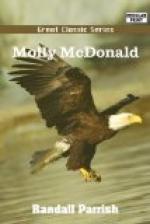The real truth was that Hamlin comprehended much more fully than did the men at Devere the danger menacing travellers along the main trail to Santa Fe. News reached Fort Union much quicker than it did that isolated post up on the Cimarron. He knew of the fight in Raton Pass, and that two stages within ten days had been attacked, one several miles east of Bent’s Fort. This must mean that a desperate party of raiders had succeeded in slipping past those scattered army details scouting into the Northwest. Whether or not these warriors were in any considerable force he could not determine—the reports of their depredations were but rumors at Union when he left—yet, whether in large body or small, they would have a clear run in the Arkansas Valley before any troops could be gathered together to drive them out. Perhaps even now, the stages had been withdrawn, communication with Santa Fe abandoned. This had been spoken of as possible at Union the night he left, for it was well known there that there was no cavalry force left at Dodge which could be utilized as guards. The wide map of the surrounding region spread out before him in memory; he felt its brooding desolation, its awful loneliness. Nevertheless he must go on—perhaps at the stage station near the ford of the Arkansas he could learn the truth. So he bent lower over the buckskin’s neck and rode straight through the black, silent night.
It was a waterless desert stretching between the Cimarron and the Arkansas, consisting of almost a dead level of alkali and sand, although toward the northern extremity the sand had been driven by the ceaseless wind into grotesque hummocks. The trail, cut deep by traders’ wagons earlier in the spring, was still easily traceable for a greater part of the distance, and Hamlin as yet felt no need of caution—this was a country the Indians would avoid, the only danger being from some raiding party from the south. At early dawn he came trotting down into the Arkansas Valley, and gazed across at the greenness of the opposite bank. There, plainly in view, were the deep ruts of the main trail running close in against the bluff. His tired eyes caught no symbol of life either up or down the stream, except a thin spiral of blue smoke that slowly wound its way upward. An instant he stared, believing it to be the fire of some emigrant’s camp; then realized that he looked upon the smouldering debris of the stage station.




